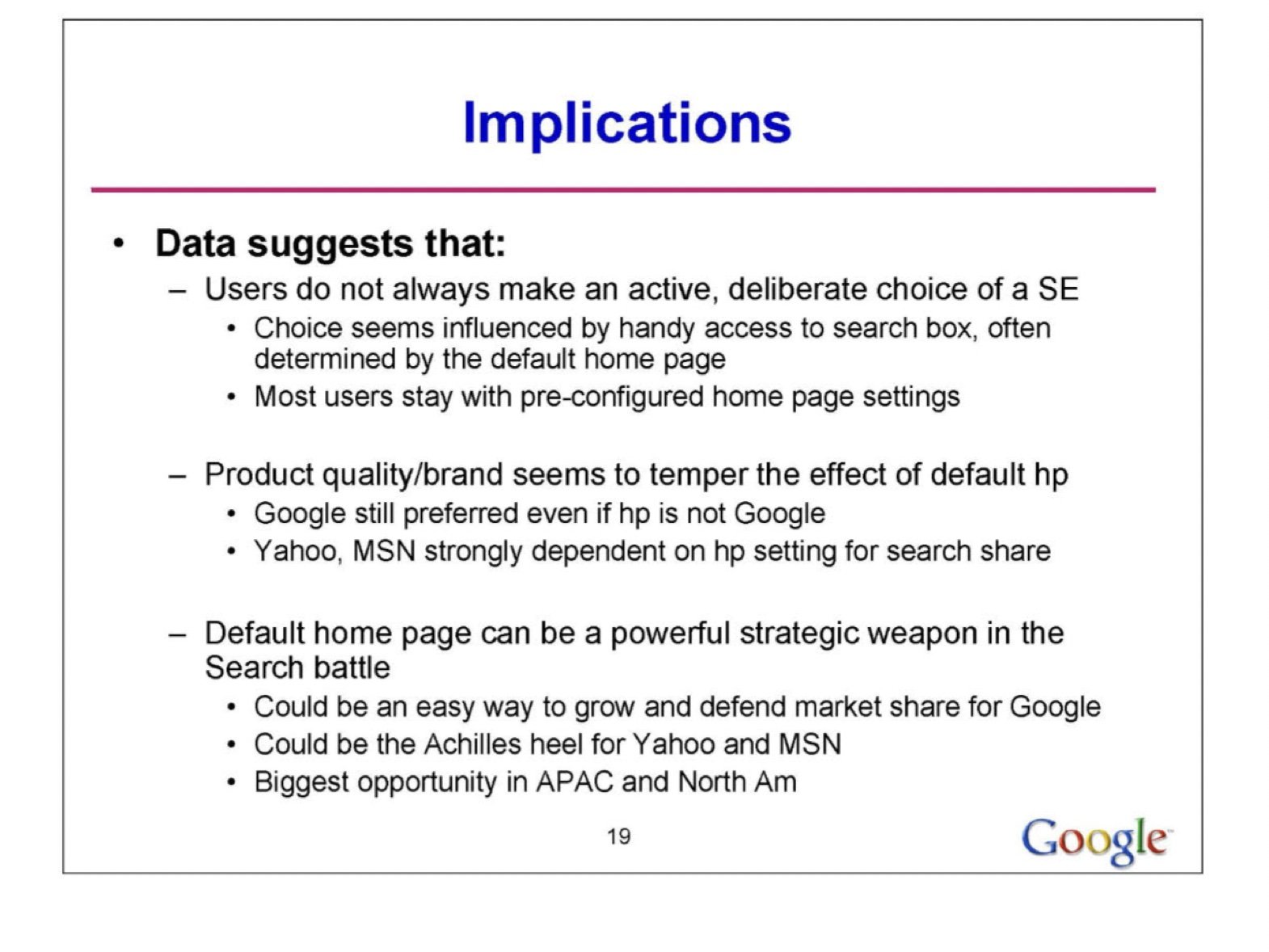TRIAL UPDATE #2: Opening Arguments Focus on Google’s Multi-Billion Dollar Cryptic Agreements
September 12, 2023
“Evidence will show that it is unquestionable that Google has enormous monopoly power.”
Kenneth Dintzer, Senior Trial Counsel for the US Department of Justice (DOJ)
DOJ’s Day 2 Exhibits Displayed in Court
A slide from an internal Google presentation shown by the DOJ in court: “Default home page can be a powerful strategic weapon in the Search battle… Could be the Achilles heel for Yahoo and Microsoft.”
We were in court as Google made its opening arguments in the capital to defend itself against allegations of monopolistic behavior in search and digital ads by dozens of states and the Department of Justice. As the government explained, Google has had its monopoly over search since 2010, and has used that power to create a walled garden that blocks new and hopeful competitors, extorts exorbitantly high rates for advertising space and discourages innovation. One thing is abundantly clear from the opening arguments and first witnesses in U.S. v. Google, the tech giant has a near untouchable monopoly over the search market thanks to its multi-billion dollar search default agreements with other tech giants.
As Lee Hepner, legal counsel for the American Economic Liberties Project, commented from the courtroom, “The Department of Justice’s opening arguments revealed that Google’s dominance over search not only ‘hermetically seals off competition,’ but also allows it to flex its power to influence how other companies, like Apple and Samsung, market and develop their own products. Google is attempting to stretch the limits of the law to claim that it helps or encourages competition. That will be a difficult case for Google to make, given the breadth of their control over search.”
The lead attorney for the DOJ, Kenneth Dintzer, laid out a clearly organized case for how the federal government intends to prove that Google illegally maintained its monopoly with exclusionary default search agreements. Using Google’s agreements with Apple and Samsung as examples, the DOJ revealed how the search giant’s power is so great that it is able to dictate the way other companies develop their products — threatening to cut revenue sharing from companies that don’t abide. It’s clear that Google would not have built its empire without default search agreements.
Following the DOJ’s opening argument, and separate opening argument of the plaintiff States, Google previewed its own case. Google is trying to stretch the limits of US antitrust laws by claiming that its default contracts improve competition in markets outside of general search engines, namely for web browsers and cellphones. Google also misled the public by claiming it’s easy for people to switch their default search engine. They know, as everyone else does, that it’s simply not and that’s why so few people do it. And when asked by Judge Mehta for data supporting this, Google, a company with seemingly infinite resources, had nothing to provide.
The first round of questions went to Google’s Chief Economist, widely called the central architect of surveillance capitalism, Hal Varian. He has worked for Google for more than two decades, and he struggled to answer the government directly while keeping up with Google’s line that default search settings weren’t about market domination. Pulling up an incredible exhibit, called “Antitrust Basics for Search Team,” showing that Google evades antitrust scrutiny not with compliance, but by training staff not to talk about violations, Dintzer asked Varian why he consistently advised his Google colleagues to “avoid any reference to ‘markets’, ‘market share’ or ‘dominance’” and “‘to avoid discussion of ‘scale’” He then asked point blank if it was it to reduce evidence of Google’s anti competitive conduct, which was the nail in the coffin when Microsoft was found guilty of monopolistic behavior in 2001. In a 2003 titled “Thoughts on Google v Microsoft,” Varian wrote, “We are currently a dominant player, and we are trying to discourage entry by a potential competitor.”
“We also have to be sensitive about antitrust considerations,” wrote Varian. “We should be careful about what we say in both public and private.” ‘Cutting off their air supply’ and similar phrases should be avoided.”
Here’s an excerpt of Varian’s damning testimony from court today:
Dintzer/DOJ: Defaults are powerful, are they not?
Varian: I don’t know if I’d say that.
Dintzer/DOJ: You coined the phrase “power of defaults,” did you not?
That’s all for now. We’ll let you know of all significant developments in the trial as they happen. We’ll be there, watching, learning and rooting for justice.
